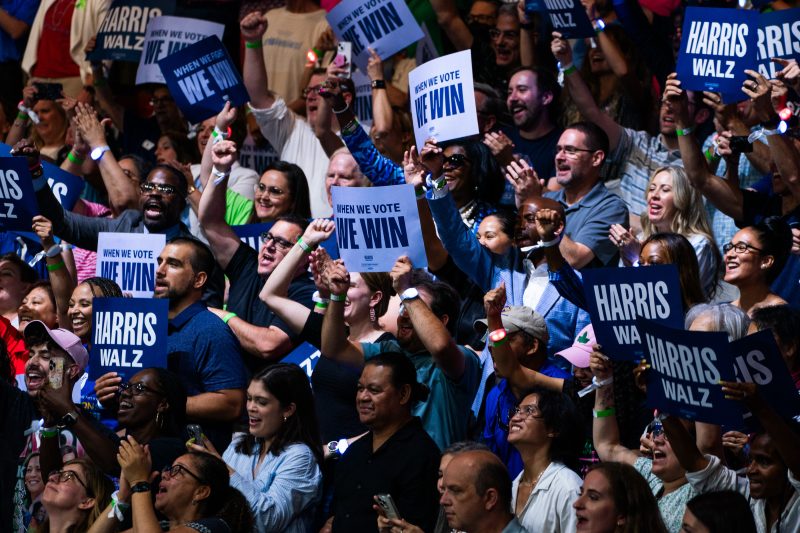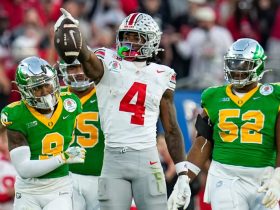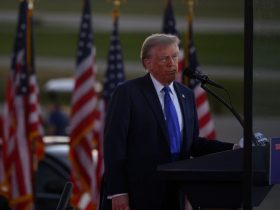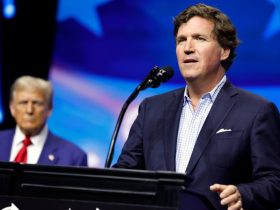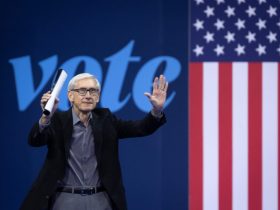The DJ at Vice President Kamala Harris’s recent rally in Philadelphia turned up the volume on Ludacris’s “Move B—-!” as the emcee encouraged the crowd to direct the song’s aggressive yet catchy lyrics toward Republican presidential nominee Donald Trump.
“Move, b—-!” the exuberant rallygoers chanted Tuesday. “Get out the way!”
A few minutes later, Pennsylvania Gov. Josh Shapiro riled up the crowd by summarizing his governing philosophy: “Get s— done!” That motto was echoed verbatim the following day by Michigan Gov. Gretchen Whitmer during a Harris rally that included audience chants of “Hell yeah,” a reference to Harris as a “bada– woman” and at least one f-bomb from the stage.
Harris, the woman at the center of a groundswell of enthusiasm that has Democrats singing, smiling and swearing, seems to be the rare public speaker not dropping expletives these days at her rallies, which have been growing in both size and edginess.
While Republican nominee Donald Trump has long traded in public vulgarity, thrilling supporters at rallies by shouting “bulls—” and labeling his opponents with crude nicknames, Harris’s campaign has deployed profanity to tap into a different element of the political zeitgeist. For Harris’s allies, the atmosphere at her rallies offers an opportunity to draw an upbeat contrast with Trump’s political movement while still embracing the kind of language that makes supporters feel they are participating in a bold cultural phenomenon.
Known to swear liberally behind closed doors, a practice she has said ramped up after she became vice president, Harris has used profanity both to express outrage and to create a sense of intimacy with her private audiences, according to aides and allies.
There is a long history of presidents cursing in the White House, historians say, including Lyndon B. Johnson, Richard M. Nixon, Barack Obama and others. One of President Joe Biden’s most famous quotes came from his time as vice president, when he described the passage of Obama’s signature health care law, the Affordable Care Act, as a “big f—ing deal.”
But as Harris aims to become the first woman of color to ascend to the presidency, her public commentary is likely to be more heavily scrutinized than the men who have held the office, historians said. At times, she has tiptoed near the edge of linguistic decorum before reeling herself in.
“Can you believe they actually put that … in writing?” she said last month at a Massachusetts fundraiser, implying a crude term when describing the Project 2025 agenda backed by some Trump allies. “I know there are kids here, so I’ll delete some words.”
Harris’s campaign declined to comment.
Minnesota Gov. Tim Walz, Harris’s running mate, has been slightly less reserved in his public remarks. Credited with helping Democrats brand Trump and his vice-presidential nominee, Sen. JD Vance (Ohio), as “weird,” Walz has been praised by some in the party for his plain-spoken rhetoric. And cursing can be a political signifier of authenticity, echoing the way many people speak in day-to-day life, analysts say.
Walz has said his party should lean into a joyful message while undercutting its adversaries with lighthearted jabs, rather than treating the opposition as a foreboding, existential threat. One of his biggest applause lines at a recent rally in Michigan came as he addressed Republican book bans, using a folksy rationale that contrasted with grave Democratic warnings that such restrictions would undermine democratic values.
“It’s amazing what minding your own damn business does to make things work better,” Walz said. “Don’t like a book? Don’t read it.”
In his public events with Harris, Walz has limited his profanity to a few “damns” and “hells,” though those who know the former football coach say he has a much broader repertoire of risqué language.
“He’s the only governor I know who curses more than I do,” Whitmer said at the rally, in which she hailed “the freedom to make your own damn decisions about your own damn body.”
“Hell yeah!” the crowd roared back in unison.
At least in public, Harris has not used her self-described proficiency with profanity since beginning her upstart presidential campaign last month, largely sticking to prepared remarks and avoiding interviews in which she might speak off the cuff.
The vice president got a preview in May of the kind of stir her words could cause, when she used blunt language to describe her thoughts about breaking barriers.
“We have to know that sometimes people will open the door for you and leave it open,” Harris said in a moderated conversation with actor and comedian Jimmy O. Yang at a meeting of the Asian Pacific American Institute for Congressional Studies. “Sometimes they won’t, and then you need to kick that f—ing door down.”
The remark elicited laughter and applause from the crowd, but also led to criticism and media scrutiny as detractors seized on her choice of words.
For his part, Trump has long been known for profane language, perhaps making his more recent vulgarities seem less novel. He has referred to African nations as “s—holes,” called Biden a “son of a b—-” and was captured on tape boasting of grabbing women “by the p—-.”
The former president’s supporters have often echoed his coarseness by chanting, “F— Joe Biden” and wearing shirts that refer to Harris using a slur directed at women.
While there is a long history of presidents swearing in private, and a growing level of acceptance for public profanity from political leaders, Harris has to grapple with the reality that Americans have never experienced a woman in her position using language that some consider unbecoming, said Tevi Troy, a presidential historian.
“There’s the question of whether it’s appropriate for a president to be cussing. Then there’s the second question of whether it’s considered ladylike to be cussing,” said Troy, who has studied the history of presidents and profanity. “So she’s operating in both spheres, and we’re in uncharted territory.”
He added that while politicians once had to apologize when their private cursing was made public, today they face little blowback — and often gain boisterous approval — as they increasingly use expletives before large crowds.
Still, Trump’s campaign has weaponized some of Harris’s more informal moments, emphasizing the risks she faces in a heated political environment. Trump’s first television ad of the general election used video clips of Harris dancing and laughing, splicing them into an attack on the more serious matters of border security, crime and terrorism.
In private chats with journalists, Harris often sprinkles her remarks with salty language in a way that creates a sense that she is letting her guard down. During an extended interview with a Rolling Stone reporter earlier this year, she twice said that the actions of the Supreme Court had prompted her to swear.
“It’s f—ed up,” she told the reporter, dropping her voice to emphasize the expletive as she talked about the oral arguments in an abortion case the justices heard in April.
She said she had a similar reaction when she learned of the court’s decision in 2022 that overturned Roe v. Wade, the landmark abortion rights case. “I called my husband, Doug — because, you know, I could use words with him,” Harris said. “And I was just like, `Bleep. Bleep. Bleep. Bleep. Can you believe what they did?’”
Some Democratic, liberal and labor leaders have tried to tap into what they see as righteous anger among their supporters by expressing similar sentiments at Harris rallies, usually without the bleeps. Their uncensored remarks are often the biggest applause lines at the raucous events.
“I don’t know how you feel, but I’m f—ing angry!” United Auto Workers President Shawn Fain said Wednesday at the airport rally. He added, “Donald Trump doesn’t know s— about the auto industry, and he doesn’t give a damn about the working class of this country.”
Abbie Cheeseman contributed to this report.

